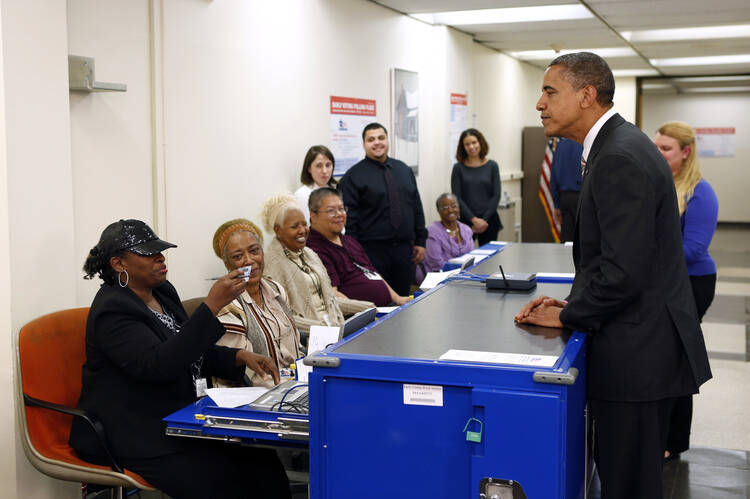On Thursday, a federal judge struck down Texas’s voter ID law, which requires citizens to produce photo identification in order to cast ballots in federal and state elections. (The law does not make the same demands of those mailing in absentee ballots.)
U.S. District Judge Nelva Gonzales Ramos characterized the law as an “unconstitutional poll tax” because of the burdens placed on citizens who do not have driver’s licenses — or concealed handgun permits, which the law recognizes as a valid ID. (College IDs are not accepted.) The Dallas News, citing the U.S. Justice Department, reports that of 13.6 million registered voters in Texas, “more than 600,000 … mostly blacks and Hispanics, lack any eligible ID to vote.” In her opinion, Ramos writes that the law “has an impermissible discriminatory effect against Hispanics and African-Americans, and was imposed with an unconstitutional discriminatory purpose.”
The Texas law is part of a trend, mostly limited to Republican-run states, to impose tighter requirements to register and to vote. Proponents of such laws say they are needed to combat fraud, but Bloomberg News reports, “Evidence in a two-week trial in September showed that Texas, the second most populous U.S. state, uncovered only two instances of in-person voter fraud among more than 62 million votes cast in all Texas elections during the preceding 14 years.”
(Also this week the U.S. Supreme Court blocked a voter ID law in Wisconsin, on the grounds that its hasty implementation for next month’s election would cause confusion and disenfranchisement. As the same Bloomberg News story notes, civil rights groups argued that “the state won’t be able to adequately train poll workers, educate voters and get IDs into the hands of the 300,000-plus people who qualify for them.”)
Arguments against voter ID laws mostly center on fairness, and the discriminatory effects such laws have on lower-income and minority voters, as well as first-time voters and younger voters who are more likely to change residences frequently. (All of these groups lean Democratic.)
Judge Ramos addresses these issues in her 147-page ruling, but she also makes a cogent and powerful rebuttal to the state of Texas’s argument that voter ID laws increase “confidence” in the election process. Ramos writes: “There is a substantial risk of the loss of confidence when fully qualified, registered voters cannot vote in person and are relegated to the less reliable mail-in ballot or cannot vote at all.”
That’s an idea that I believe — or I hope — is still being taught in middle-school civics classes. But in the adult world, we seem to be giving more and more legitimacy to the idea that democracy is better served by limiting the number of people who are allowed to participate in the process. Besides voter ID laws that are designed to make certain demographic groups prove they’re worthy of what is supposed to be a universal right, one obstacle to immigration reform is the horror that some feel at the prospect of new citizens being allowed to vote. And every election year brings smug op-ed columns about how citizens who are less informed than the columnists have a duty not to vote.
But Judge Ramos is correct. A contracting electorate can only lead to a “loss of confidence” in the outcome of elections. It is exactly the wrong way to deal with increasing cynicism and suspicion toward our system of government.








